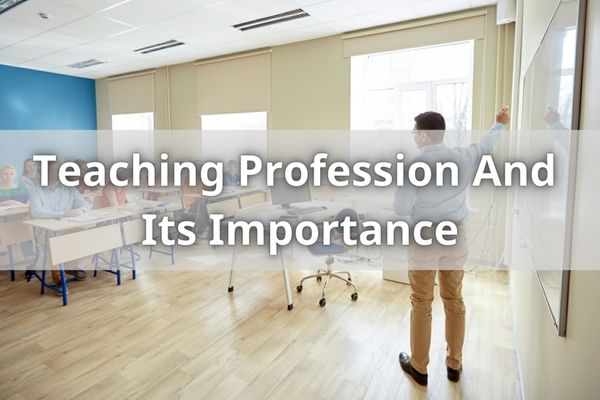What Degree Do I Need To Be A School Counselor? – Answered
A profession in school counseling is one that is both interesting and fulfilling, but it also calls for a particular amount of education. What degree do I need to be a school counselor, if you’re pursuing a career in this area?
The sort of job you wish to play in the industry and the state requirements both go into this. In this post, we’ll talk about how to be ready for interviews and continuing education classes that are relevant to your line of work, as well as the minimal educational requirements to become a school counselor.
By understanding the qualifications needed, you can start planning and achieving your goals in becoming a successful school counselor.
Overview Of School Counselor Qualifications

There are requirements you must fulfill in order to succeed as a counselor.
State licensing or certification, as well as at least a master’s degree in counseling or a closely related discipline, are usual requirements for school counselors. Many states also require school counselors work to complete an internship and pass an exam. Additionally, certain jobs could want other specialities or certificates, such those in drug addiction or mental health counseling.
You may go on the path to becoming a certified school counselor with the correct mix of education and experience.
The majority of states need school counselors to possess a master’s degree in counseling or a closely related discipline, such as psychology or social work. Next, let’s talk about the minimal educational requirements for school counselors.
Although there isn’t a one-size-fits-all method for earning these degrees, the majority of institutions demand that students complete courses in human development, career planning, and ethical issues before they can receive a school counseling program degree. Additionally, many programs provide internships so prospective counselors can gain hands-on experience working with children and adolescents in various settings before entering the workforce.
Minimum Education Requirements For School Counselors
You can make your dreams of becoming a school guidance specialist come true with the right education! You must have a degree in school counseling in order to work as a counselor in schools. This might range from an associate’s degree to a PhD degree, depending on the state.
In general, school counselors must have at least earned a bachelor’s degree, according to most states. Counselors in schools aid kids with academic growth and preparation as well as with social and emotional support. Aspiring school counselors should possess advanced understanding in fields including career counseling, human growth and development, and other mental health issues in order to properly deliver these services.
With this minimum education requirement met, you can prepare yourself for further studies in order to build on your skillset for success in the field of school counseling.
Bachelor’s Degree Programs For School Counselors
With a bachelor’s program, you can gain the specialized knowledge needed to become an effective school guidance specialist and school counselors help students in their academic and personal development.
A bachelor’s degree in human development is typically required for entry-level positions as a school counselor. This type of program provides courses covering topics such as counseling techniques, developmental psychology, child abuse prevention, family dynamics, educational law, and career planning.
Many states also require that counselors complete an internship experience to meet board requirements for licensure. A bachelor’s degree offers a comprehensive understanding of the field but may not be enough for more advanced positions or those seeking greater leadership opportunities within the industry.
To take your skills to the next level, you may need to consider pursuing a master’s degree in counseling or another related specialty area, which would be beneficial for transitioning into roles requiring higher levels of expertise and responsibility.
Master’s Degree Programs For School Counselors
Pursuing a master’s can take your school counseling career to the next level, unlocking more advanced positions and greater leadership opportunities. For individuals seeking specific information on subjects including student development, multiculturalism, traumatic events, focusing on mental health difficulties, and more, a master’s degree in counseling or a master’s in school counseling may be the best option.
By obtaining a master’s degree program from an accredited university, students will learn to provide individual and group support services while addressing educational barriers in schools. With this additional training, school counselors are able to better serve students by developing comprehensive education plans and collaborating with teachers, administrators, parents, or guardians. Moreover, having a master’s in counseling or school counseling gives professionals the added advantage of pursuing higher-level jobs that require higher salaries and benefits.
A doctoral degree is also available for those interested in furthering their careers even more. This type of school counselors provides an even deeper understanding of psychological theories and research methods, which can be applied directly into the field of school counseling.
Doctoral programs also provide extensive training on how to implement best practices within the educational system while offering guidance on how to design interventions customized for each student’s needs. With this extra knowledge and experience gained through pursuing a doctoral degree program, graduates are well-prepared to take up roles as educational leaders overseeing multiple counselors while advocating for improved access to quality educational resources regardless of socio-economic backgrounds or race/ethnicity.
Moving onto a doctoral degree program is the next step towards making lasting changes within our education system for future generations.
Doctoral Degree Programs For School Counselors

Experience an even deeper understanding of psychological theories and research methods to help make lasting changes in our education system by pursuing a doctoral degree program.
According to the Bureau of Labor Statistics, most school counselors who work in public schools have at least a Master’s Degree in School Counseling or a Master’s Degree in Counseling. To earn either degree, students need to complete extensive educational requirements, including coursework and clinical experience.
With a doctoral degree, you can take your education one step further and gain additional specialized knowledge related to counseling that can help you make even bigger impacts on our educational systems. Through this type of advanced training, you’ll gain critical insight into new psychological techniques and research approaches that will expand your therapeutic skillset and prepare you for more opportunities within the field.
Transitioning from a master’s degree program to a doctoral program may require additional courses as well as comprehensive examinations, but it’ll be worth it when you achieve your ultimate goal of helping others through meaningful change.
Professional Certification Requirements For School Counselors
Gaining professional certification is an excellent way to demonstrate your commitment to the field and take your school counseling career to the next level. Most states require that school counselors may have a master’s degree in counseling, but they must also meet specific certification requirements.
For those without a master’s degree:
- A bachelor’s degree in any field along with a supervised internship experience
- A thorough understanding of human development and different therapies available for students
For those with a master’s degree:
Proof of completion of a state-approved program from an accredited college or university
- Additional coursework covering topics such as marital therapy, trauma, substance abuse, learning disabilities and more
- Professional certification can be a great way to show dedication and knowledge when it comes to being involved in school counseling. With that said, it’s important to understand the licensure requirements for school counselors as well.
Licensure Counselor Requirements For School Counselors
In addition to professional certification, school counselors must also obtain licensure in order to practice. Licensure requires a degree in counseling and completion of a number of specified courses.
Earn your bachelor’s degree is the minimum requirement for licensing, however many state’s requirements need a master’s degree and/or additional coursework hours. Depending on the state, licensure may require passing an exam or other evaluations. A bachelor’s or master’s degree in counseling from an accredited institution of higher learning is normally required for licensing.
In certain areas, extra requirements would need to be met before being granted a license to work as a school counselor. It’s crucial to confirm the specific criteria for acquiring a license to work as a school counselor with your local state board of education.
With all these requirements met, you’ll be ready to pursue your career as a school counselor!
State-Specific Requirements For School Counselors
To succeed as a school counselor, it is crucial to understand the precise license criteria in your state, so be sure to contact the board of education in school counseling there! There can be varying requirements for acquiring a school counseling license depending on where you reside.
Here are some important considerations when researching state-specific requirements:
- Median Salary: A median salary will give you an idea of what to expect when entering into the field.
- Degree in Psychology: Most states require a degree in psychology or related field before applying for licensure.
- State Requirements: Different states may have different expectations regarding coursework and continuing education credits.
By understanding the unique needs of each state, you can ensure that you meet all necessary criteria for becoming a licensed school counselor. With the right knowledge and preparation, it’s possible to achieve your goal of becoming a successful school counselor!
Obtaining Work Experience For School Counselors

Don’t pass up this chance to further your career as a school counselor since gaining practical experience in the field of counseling may be a terrific way to boost your confidence and sharpen your abilities.
Counselors in schools collaborate closely with pupils, parents, educators, and administrators to offer advice on academic, interpersonal, and emotional problems. They assist students make educated decisions about their futures in terms of education and careers in addition to offering counseling services.
Most states require that school counselors complete supervised practicum experiences in sociology or psychology prior to licensure. Therefore, obtaining relevant work experience through research and an internship or volunteer opportunities is a great way to gain valuable insight into the profession of school counseling.
Furthermore, such experiences can help you stand out during the job interview process when preparing for the school counselor position.
Preparing For The School Counselor Interview
You’ll be ready to ace the school counselor interview with confidence when you prepare for it beforehand!
Before the interview, it’s important to review the school counselor job description and research what certification or degree requirements your state requires.
Additionally, familiarizing yourself with national counseling standards and understanding group counseling techniques can also help bolster your interview performance.
Crafting answers that demonstrate your competency in those areas will make a great impression on potential employers.
It’s important to remember that during an interview, you’re selling yourself as well as showcasing your knowledge of the field.
Being prepared for questions related to how you handle difficult situations or how you manage different types of students can go a long way in helping to secure a position.
With careful preparation and practice, you’ll be poised and confident going into any school counselor job interview.
By researching continuing education requirements for school counselors ahead of time, you can further demonstrate your commitment to professional development and staying current in best practices.
Continuing Education Requirements For School Counselors

Gaining knowledge of continuing education requirements specific to school counselors can help you stand out and show your dedication to the profession. While requirements vary by state, there are some general rules when it comes to continuing education for school counselors.
Many states require that a counselor holds a master’s degree in counseling or related field before they can be certified or licensed as a professional school counselor. Additionally, many states require that counselors maintain an accreditation from the National Board for Certified Counselors or other approved organization.
Furthermore, some states may also have specific educational requirements in school counseling such as taking courses related to guidance and counseling or participating in workshops and seminars on topics such as bullying prevention.
In order to stay up-to-date with current trends in the field, many school counselors choose to pursue their doctorate degree programs in counseling and related fields such as higher education leadership or educational administration. Not only is this beneficial from a career perspective, but engaging in advanced study can also help build relationships with local universities and community organizations which could potentially lead to additional job opportunities down the line.
Conclusion: What Degree Do I Need To Be A School Counselor?
I’ve learned that a school counselor needs to meet certain educational requirements to be successful. A bachelor’s degree is the minimum, but a master’s or doctoral degree might be necessary depending on the state. Obtaining experience and preparing for an interview are also important steps in this process. And last, in order to maintain my certification, I must stay current with continuing education requirements.
Although some of these activities may seem overwhelming, having all the necessary information makes them much simpler! I’m confident that with enough perseverance and hard effort, I can succeed in my career as a school counselor.







